FCA builds temporary learning spaces in South Sudan in order to improve access to quality education for children and youth in Fangak County. Armed conflict and logistical complications, like fuel shortages, have delayed the implementation of the project.
War in South Sudan has forced numerous children out of school since the conflict erupted in December 2013. FCA strives to improve the access to quality education in Fangak County in Jonglei State with the funding of European Commission Civil Protection and Humanitarian Aid Operations ECHO.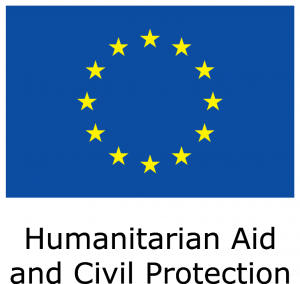
Before the conflict Fangak County had 30 schools. Three out of four were destroyed during fighting, and around 40 per cent of the students haven’t attended school since. Most schools are run under trees.
On average, children walk 35 minutes to school. On the extreme, some children have to walk for an estimated 3 hours to reach the nearest school, contributing to fatigue and high dropout rates.
FCA is now addressing the issue through the construction of ten temporary learning spaces that are located in the payams of Old New Fangak, New Fangak, Toch, Pulita, Manajang and Barboi – all within Fangak County.
The project also aims to provide children in 16 schools with learning materials. Currently only 30 per cent of the students have access to such.
Education services will be improved through intensive teacher training, mentoring and active participation of communities. Parent-Teachers Associations (PTAs) are involved in improving the education infrastructure, including construction of gender-segregated latrines and hand washing facilities, through a cash-for-work component.
Teachers are trained and mentored on teaching methods, child-protection, as well as psycho-social support, while PTAs will be trained in school administration and how to practically apply a child rights approach to administrative structures and school design.
The initial plan was to build semi-permanent learning spaces, but transporting building materials became increasingly difficult because of practicalities like the fuel shortage in Juba early this year. Boats became stranded for weeks and the lack of fuel limited the movement of goods and project staff as well.
FCA solved the issues by resorting to the use of locally available materials. This resulted in a significant reduction in building costs, which translates to three more temporary learning spaces than initially planned being constructed.
Read more about FCA in South Sudan on our country page. Read more about ECHO in our international donors section.
Seven years ago an earthquake destroyed homes and schools in Haiti. It was the starting point of Finn Church Aid’s largest humanitarian operation up to then; an operation that allowed thousands of children to return to school and continue their education. What will be the legacy of that work?
A devastating earthquake hit Haiti in January 2010. In the blink of an eye, 220,000 lives were lost and 1.3 million people were left homeless. Haiti, one of the poorest nations in the world, was utterly crushed by this enormous disaster. Immediately after the earthquake, Finn Church Aid sent emergency assistance to the country, soon followed by humanitarian workers.
As the extend of the devastation became clear, proceedings from the Common Responsibility Campaign, Finland’s largest national fundraising campaign, were allocated not only for development cooperation, but also for emergency aid to the victims of the earthquake. Countless Finnish donors have supported FCA’s operations in Haiti, many of them for years.
After responding to the acute emergency needs, FCA set up a Country Office in Haiti. First, school tents were delivered so schools could resume activities. Then, temporary school structures were built to regions most severely affected by the disaster. Parents of local school children often helped with construction.
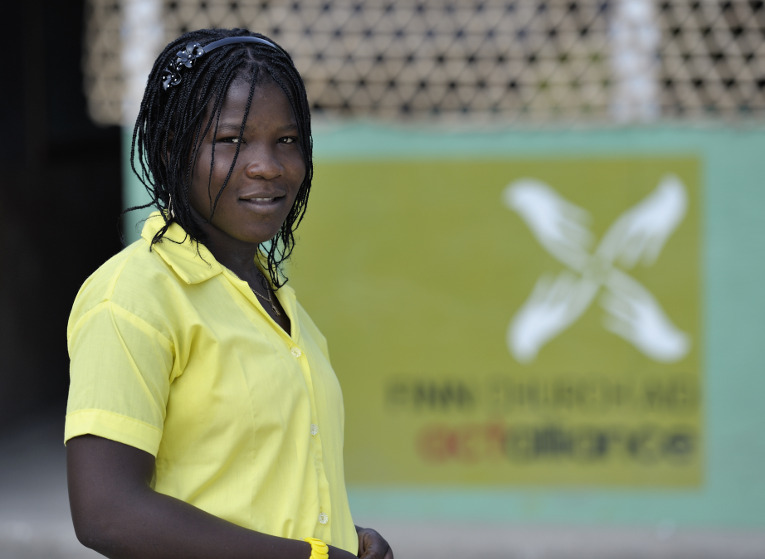
Kathia Amy, a 17-year old in Grand-Goave, Haiti, one year after the January 2010 earthquake. She is pictured here in front of her school, the College Les Freres Milord, which was rebuilt after the quake by Finn Church Aid. Photo: Paul Jeffrey.
Although the temporary school structures were rudimentary, with walls made of tarpaulin or plywood, reopening schools gave people a chance to resume, at least to certain extent, their normal, everyday lives. As children in school uniforms reappeared on the streets, Haitians got a sense that life was returning to normal.
Early on, the light structure of the schools was a positive thing, since people who had experienced the earthquake would not have felt comfortable surrounded by heavy roofs and thick walls.
Thousands returned to school
Within the first two years, more than 340 temporary classrooms were built. Construction on permanent school buildings also began soon after the earthquake.
“The 17 schools Finn Church Aid constructed, as well as the remaining six schools and one vocational school still under construction, are sustainable and modern buildings, highly appreciated by local communities”, says Uluç Baslanti, FCA Country Manager for Haiti.
All schools are earthquake-resistant and provide a safe environment for children to learn in. FCA has provided all schools with school equipment, kitchens, and water and sanitation facilities. The schools will be in use for decades.
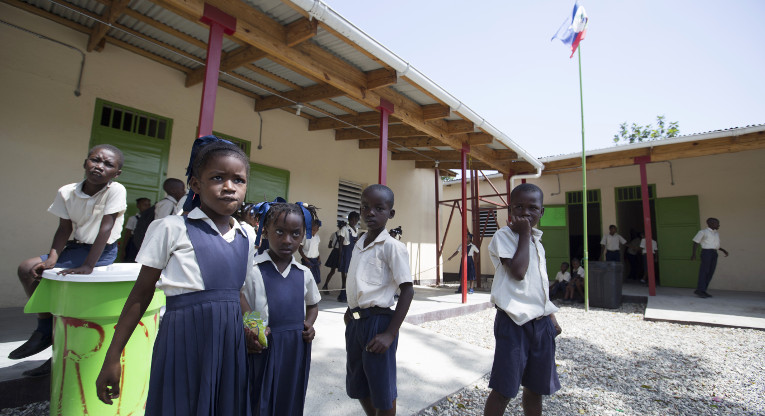
All schools are earthquake-resistant and provide a safe learning environment for children. Students at Myrdud school, Léogâne, in 2014. Photo: Minna Elo.
The temporary or permanent schools built by FCA have given 22,000 children a chance to study.
Major supporters of the school construction effort were The Inter-American Development Bank (IDB), UN Development Programme UNDP and The Primate’s World Relief and Development Fund (PWRDF).
School construction was the biggest and most visible part of FCA’s work in Haiti, but by far not the only one. One major result of FCA’s work has been encouraging communities to participate in the development of education and to weigh influence on their own situation.
Haiti
- Haiti is the poorest and least developed country on the western hemisphere. Literacy rate is at 60 percent and 12 percent of the population have access to the Internet. The need for education is extremely dire.
- Finn Church Aid is forced to end its work in Haiti this year as a result of funding cuts made to development cooperation.
- The work was extended for early 2017 to give FCA time to repair schools damaged in the hurricane and continue distributing psychosocial support and school lunch programmes in hurricane affected areas. Training was given to teachers to improve their disaster preparedness. FCA also distributed school supplies to students and teachers.
Entire communities were included in the running of schools with the foundation of school committees where school directors, teachers, students and parents all participate. Parents gained understanding on the importance of education and became more interested in participating in their children’s schoolwork.
Additional training on student-centred teaching methods, and education of teacher trainers through volunteers of the Teachers without Borders network have improved the quality of teaching and the wellbeing of students.
Through its local partners, FCA has also supported literacy training for around one thousand illiterate adults. Women’s savings groups and livelihoods have been supported through Women’s Bank. Since Haiti is a country vulnerable to natural disasters, FCA and its local partners have strengthened the disaster preparedness of local communities. This preparedness was put to the test when a strong hurricane passed through Haiti in October 2016.
Even though hurricane Matthew resulted in property loss, people involved in FCA programmes have said they are proud of what they know they have achieved. Not even a hurricane can take away the new information and new skills that make a community stronger and better prepared.
“Haiti changed everything”
The humanitarian operation following the 2010 Haiti earthquake permanently changed the direction of Finn Church Aid.
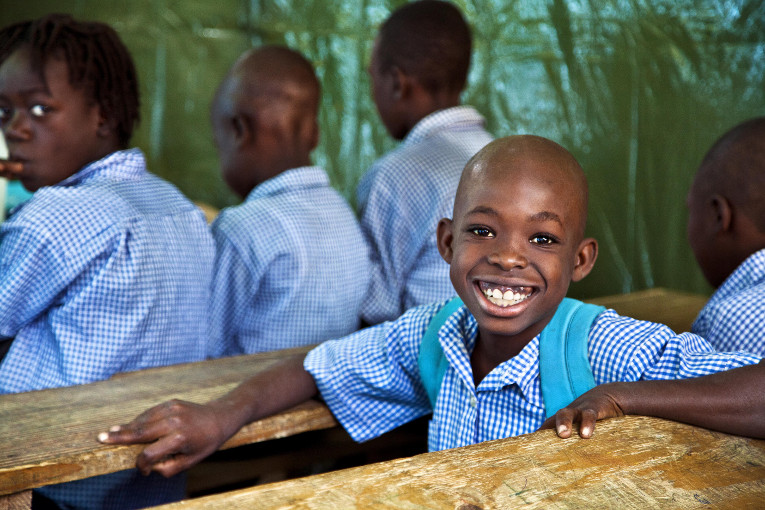
Dorrel Kensy went to first grade in St. Pierre’s tarpaulin school in 2012. He favorite subject were mathematics and science. Now there iare permenent, safe school buildings at the site. Photo: Zara Järvinen.
“FCA isn’t the same organisation it was prior to the Haiti earthquake. That event marks one of the major milestones in FCA’s history”, says Eija Alajarva, Head of Humanitarian Assistance.
In earlier natural disasters, FCA had mainly assisted emergency efforts by funding local NGOs, like other members of the ACT Alliance, a coalition of church-affiliated humanitarian organisations. In Haiti, the magnitude of devastation meant that education specialists like FCA were gravely needed.
“Haiti has been a successful operation for FCA, but we learned many things the hard way, since there was no time to develop and test things in practice before implementing them on the field.”
Since Haiti, FCA has purposefully developed its readiness to assist in major natural disasters. The lessons learned were put to use in 2013 when typhoon Haiyan bruised the Philippines, and in 2015 when Nepal was struck by an earthquake.
“We are continuously developing our operation in order to offer the best possible response when a disaster strikes. Without Haiti we would be a very different organisation.”
Text: Ulla Kärki and Noora Jussila
A vehicle belonging to a national non-governmental organisation fell into a deadly ambush on its way to Pibor in South Sudan on Saturday 25th of March. The incident is a grave attack against aid workers causing calls for investigation.
Six staff members of the South Sudanese humanitarian aid agency GREDO were reportedly killed when their vehicle fell into an ambush last Saturday. The incident occurred in the early morning hours on the road leading from the capital Juba to Pibor town, which is approximately 250 kilometres away.
The aid workers were traveling in a convoy when the attack happened. The bodies of the aid workers were found on the road by the convoy members who reached the area after some time.
GREDO has been a partner to Finn Church Aid in South Sudan since 2016. Together the two organisations have supported sports for peace activities for the youth in Pibor and its neighbouring counties with the aim of increasing peaceful co-existence and unity among them.
“I’m aghast and infuriated by the despicable murder of six courageous humanitarian colleagues”, says Pio Ding, FCA’s Country Director from Juba.
“This is particularly tragic at a time when humanitarian needs have reached unprecedented levels. It is entirely unacceptable that those who are trying to help are being attacked and killed. We urge the authorities to investigate and bring the killer to justice.”
The convoy, which included several vehicles and trucks, was transporting items belonging to a number of humanitarian organisations. Among these items were school construction materials for FCA, intended to be used to build new schools in Pibor, and in neighbouring Gumruk town.
FCA has implemented quality education projects in the area since 2016.
One of the most dangerous places in the world for aid workers
This incident brings the total number of aid workers killed in South Sudan to 79, counting from the beginning of the conflict in December 2013. Attacks against humanitarian workers and their premises have been on a dramatic rise in the past couple of months. This illustrates the deteriorating situation in war-torn South Sudan.
FCA’s presence in South Sudan, one of the most fragile states in the world, stretches back to 2010 when it established its country office in Juba. In 2017 FCA implements projects in the states of Jonglei, Central Equatoria and Lakes.
Open conflict, insecurity and a failing economy are making it increasingly difficult for aid workers to deliver desperately needed lifesaving assistance to the most affected communities.
The killing of aid workers will further hinder the provision of humanitarian aid to alleviate the suffering of the South Sudanese people.
“The appaling trend of attacks and intimidation against aid workers and assets remain a feature of the operating environment. This has to stop immediately and perpetrators must be brought into account”, says Ding.
In February, famine was declared in parts of South Sudan, where the lives of 100 000 people are now threatened. A further 5 million are considered to be at the brink of starvation.
The conflict, which began from a rivalry between President Salva Kiir and his former deputy Riek Machar, is now in its fourth year, and it has led to the death of thousands and to the displacement of millions.
People are dying from hunger in South Sudan as more than half of its population suffers from an urgent lack of food. The conflict has forced farmers to abandon their fields, and the cost of basic food commodities increase daily.
Text: Erik Nyström
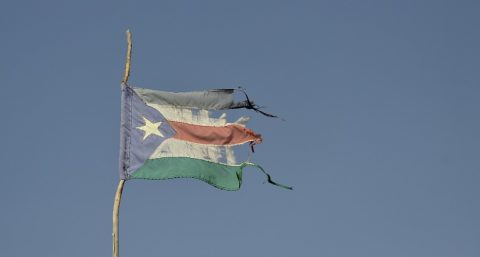
The flag of South Sudan, a little worse for wear, flies over the market in the town of Alek. Photo: Paul Jeffrey / ACT Alliance
Africa’s worst war is entering its fourth year, but the situation only seems to get more dreadful.
A famine threatening a hundred thousand people’s lives was declared in parts of South Sudan in February, and a million more are considered to be at the brink of famine. The situation is described as man-made.
Because of the constant conflict, insecurity and displacement, people are unable to cultivate and produce food for themselves or for sale, FCA’s humanitarian program adviser Moses Habib explains.
For instance the Equatoria region has traditionally been the breadbasket of the country, producing a majority of consumable foods. Now it’s also been plunged into violence and can’t produce food items as before.
“Farmers have had to abandon their fields and stop planting and harvesting. There are agricultural villages that are now completely empty. No people are left, only wild dogs”, Habib says.
Potential spillover into FCA project locations
Late last year the UN warned that the violence in South Sudan might escalate into genocide. Armed groups kill people with machetes, burn down villages and gang rape women. Hate speech fuels the conflict, and there’s a fear that words lead to action.
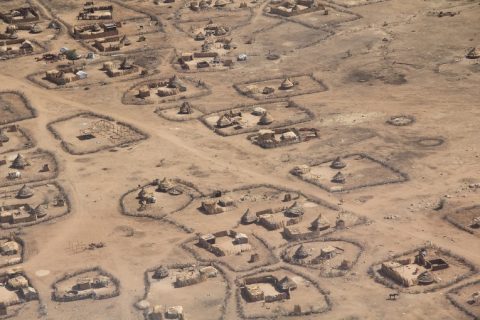
Aerial view of rural village in South Sudan. Photo: ACT Alliance
On top of all this comes a famine, which by next summer might engulf 5,5 million people if nothing’s done.
Almost the same amount of people – more than 40 per cent of South Sudan’s population – are already in urgent need of food, agriculture and nutrition assistance. The drought that plagues Eastern Africa is also to blame for the severity of the crisis. FCA supports relief efforts in the region with a total of 150 000 euros, of which a third goes to food aid in South Sudan.
Famine has been declared in Unity state, which borders Jonglei state where FCA works. FCA’s field office in Fangak County is separated from Unity state only by the Nile River.
The beneficiaries of the ECHO financed project in Fangak have fled from Unity state during previous waves of conflict and insecurity.
“There is a likelihood of the famine spilling over to our project locations. We’re expecting that the numbers of internally displaced persons will keep rising”, says Habib.
“When people are hungry and do not see any assistance coming, they will start packing their belongings and walking in search of a place where they and their children can survive.”
Prices of goods are skyrocketing
According to Habib there are also visible signs of a looming famine among urban communities, including the capital Juba, where FCA’s country office is. The goods that are available in the markets in Juba are very few, and the prices have hiked up so much that most people don’t have enough money to purchase food.
The cost of living has risen exponentially across the country. Cereal prices have increased by more than 500 per cent in only a year. A staple food such as 3,5 kilo of maize grain now costs 1,200 South Sudanese Pounds (60 euros). Before the crisis erupted last summer it cost 110 SSP (5,50 euro).
Products such as bread, meat, tea and sugar have become luxury items that the average citizen cannot afford to buy. Four pieces of bread used to cost one pound (5 cents), but now one piece costs eight pounds (40 cents).
“As the cost of basic food commodities keeps increasing on a daily basis, most families are surviving on one meal a day or nothing”, Habib says.
“Quick action needs to be taken by the government and the international community to ensure that humanitarians are able to deliver lifesaving assistance without unnecessary impediments.”
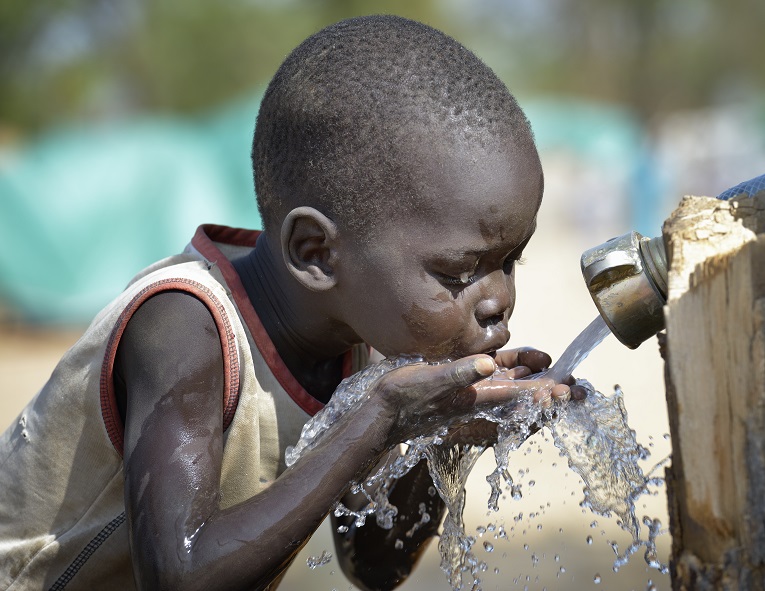
A boy drinks water from a well in an internally displaced persons camp in Aweng, South Sudan. Photo: Paul Jeffrey / ACT Alliance
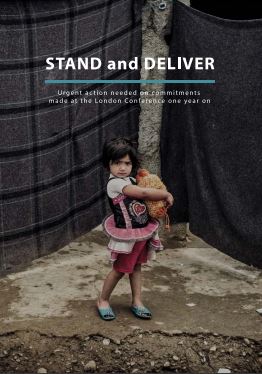 At the London conference one year ago donors and Syria’s neighbouring countries, who host most of the refugees from the war, agreed on a “comprehensive new approach” to tackle the humanitarian crisis. It consisted of financial pledges and policy changes aimed at improving the lives of refugees and host communities.
At the London conference one year ago donors and Syria’s neighbouring countries, who host most of the refugees from the war, agreed on a “comprehensive new approach” to tackle the humanitarian crisis. It consisted of financial pledges and policy changes aimed at improving the lives of refugees and host communities.
The Stand and Deliver report concludes that the conference failed to deliver on key commitments regarding civilians within Syria and the refugees in neighbouring countries. The review was made by 3 NGO platforms and 28 organisations, including Finn Church Aid.
Download the report from this link (pdf).
Finn Church Aid (FCA) begins humanitarian assistance in South Sudan’s capital Juba, where fighting broke out again last weekend. The 100,000 euros appropriated from FCA’s disaster fund will be allocated to food and water distribution. The work begins immediately.
Thousands of people, most of them women and children, have sought refuge in churches in Juba. Many have spent days inside church buildings without food and water, and have yet to receive any humanitarian assistance. The South Sudanese Council of Churches has petitioned organisations to provide immediate emergency relief.
FCA’s emergency relief will target 8,000 IDPs on three church premises. The allocated sum will be used to distribute water, food and other necessities. Relief will be provided in cooperation with the South Sudanese Council of Churches, the Catholic Church and the Anglican Church.
Unrest in Juba and surrounding areas continues for the fifth day despite a ceasefire declared on Monday evening. At least one hundred people have died. According to the UN, 36,000 people have been forced to flee the fighting in the capital.
In June, South Sudan was listed as the second most fragile state in the world behind Somalia. Re-erupted fighting will deliver a heavy blow to the basic living conditions of Sudanese people who are already suffering from poverty, illiteracy and violence. They will be dependent on outside assistance for a long time.
FCA is one of the very few Finnish organisations currently operating in South Sudan and in collaboration with the South Sudanese Council of Churches has strived to build peace in the country that is weighed down by ethnic and political conflict. In 2015, FCA also constructed 35 temporary schools, and secured access to education for 1,800 refugees in South Sudan.
Further information:
Marie Makweri (Nairobi), Peacebuilding Officer, tel. +254 795 901 262 or +358 4057 14211
Satu Helin, Reporter, tel. +35840 630 8133
Help IDPs in South Sudan by donating
Donations account: Nordea IBAN FI33 1572 3000 5005 04
Please add the message “South Sudan” to your donations.
ACT Alliance Forum South Sudan launches the EU Aid Volunteers Capacity Programme, a training for local organisations working with vulnerable communities.
Juba. “South Sudan is prone to protracted man-made and natural disasters ranging from chronic conflict to drought, floods, diseases and famine. Both local and national actors face challenges in their humanitarian response”, ACT Forum South Sudan Coordinator Mr. Omodii Alex Gupirii describes the situation of the newest and one of the poorest countries in the world.
The UN has recently warned that up to 5 million people are facing severe food shortage this summer, a situation which is made worse by the humanitarian funding shortages in the country.
“Recognizing the role of local actors in humanitarian response creates value in terms of efficiency and connectedness with the affected communities. Strengthening their capacity is fundamental”, said Mr. Gupirii at the launching event in the capital Juba.
The training consists of approaches for reducing disaster risks, working on Emergency Preparedness and strengthening knowledge and understanding of Humanitarian Principles and Standards.
“As ACT Alliance, we believe in capacity development of our members and partners to enhance their ability to achieve to achieve our common goal – Full Life & Dignity for All.”
“This project aims to build humanitarian capacities and increase leadership of our local and national partners who are in the front-line of constant humanitarian and emergency operations in this disaster prone country. We truly acknowledge that investing in local capacities will significantly enhance disaster risk reduction as power is through local action”, Mr. Gupirii says.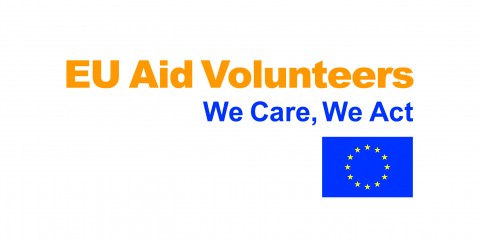
This year, ACT Alliance consortium of ten members trains local organisations in altogether eight countries: Bangladesh, Cambodia, Ethiopia, the Democratic Republic of the Congo, Myanmar, Nepal, Uganda and South Sudan.
The trainings are funded through the Capacity Building Programme of the EU Aid Volunteers initiative. The work is part of the 2014–2020 European Commission’s Humanitarian aid and Civil Protection department (ECHO) initiative called EU Aid Volunteers, bringing together organisations from different countries and strengthening the local capacity of disaster-affected communities.
FCA calls for action to reshape aid on the eve of the World Humanitarian Summit.
With over 125 million people in need of humanitarian assistance, 60 million people displaced and 37 countries affected by crises, humanitarian needs have never been greater, and the humanitarian system more stretched out. As a result, with an agenda aiming at ‘reshaping aid’, the stakes are high for the World Humanitarian Summit (WHS) which takes place in Istanbul on 23–24 May 2016.
FCA publication Beyond the World Humanitarian Summit – FCA call for action highlights FCA’s own commitments as well as its calls for governments, civil society organisations and other stakeholders to commit to the recommendations of the World Humanitarian Summit. It also features cases in point on Finn Church Aid humanitarian work.
Beyond_the_World Humanitarian Summit_FCA_call_for_action (pdf)
This year and next year, Finn Church Aid (FCA) constructs more transitional and semi-permanent learning centres with adequate water, sanitation and hygiene facilities in Nepal, extends its post-earthquake teacher training to new schools, and continues psychosocial support for teachers and children.
Devastating earthquakes hit Nepal on 24 April and 12 May 2015, destroying 770,000 homes, killing thousands and affecting millions. Four thousand schools were destroyed or damaged, keeping 1.2 million children out of classrooms.
After providing emergency relief, Finn Church Aid decided to concentrate its efforts on making it possible for children and youth to continue their studies. Within a couple of months after the earthquake, FCA had constructed temporary learning centres for nearly 20,000 students.
In 2016-2017, FCA builds 600 transitional classrooms in the districts of Makwanpur, Gorkha and Sindul with funding from UNICEF.
In remote areas of the Lalitpur district, FCA builds 40 semi-permanent (lifespan of 15-20 years) classrooms for schools which were not included in the reconstruction scheme of the Ministry of Education. FCA will also repair partially damaged, but structurally safe school buildings and tear down unsafe ones.
With the National Center for Education Development, Finn Church Aid is developing an activity package aiming to strengthen the cooperation between schools, families and communities in tackling post disaster child protection risks in Nepal. FCA is also cooperating with four secondary schools to develop an emergency school material kit especially aimed at high school-age students.
“FCA is bridging the gap between response and reconstruction to strengthen the overall quality of education, resilience and recovery at school and community level. The collective efforts of the government and NGOs fulfilled only 70 per cent of the need for temporary learning centres. Therefore, FCA continues to build additional transitional and semi-permanent learning centres”, says Finn Church Aid Nepal Country Manager Lila Bashyal.
Finn Church Aid extends its teacher training for post-earthquake recovery to new schools. The training is given in cooperation with Nepalese education authorities and gives teachers and pupils tools to manage their anxiety and identify when peer support is not enough and professional help is needed.
“FCA continues to provide psychosocial support, because even after one year of the massive earthquake, due to continued aftershocks, teachers report that earthquake survivor children are still traumatised with high levels of psychological and academic distress”, Mr Bashyal says.
The situation in the country remains severe, as people are still waiting for government support for rebuilding their homes and starting their livelihoods. Hundreds of thousands of Nepalese, who lost their homes in the earthquakes, are still living in temporary sheet metal shelters, and even in tents.
Further information:
Lila Bashyal, FCA Country Manager for Nepal, email: lila.bashyal(at)kua.fi, Tel. +977 98 511 59 106
Merja Färm, Humanitarian Coordinator, email: merja.farm(at)kua.fi, Tel. +977 98101 35798
ACT Alliance in Cambodia with the support of the EU Aid Volunteers initiative, today launched a capacity building program in Cambodia.
“The EUAV project fits well to the Cambodian context. We are now facing a drought that affects the local communities’ agricultural crops and water usage. We need to strengthen our capacity to cope and adjust to the drought and other disasters. The EUAV project provides an opportunity to build the capacity of local communities and of ourselves too to become more resilient”, says Mr Norng Sivouthan, Chairperson of ACT Forum in Cambodia.
All ACT Forum members expressed their strong commitment to work together to enhance resilience in Cambodia.
The work is part of the 2014–2020 European Commission’s Humanitarian aid and Civil Protection department (ECHO) initiative called EU Aid Volunteers, bringing together organisations from different countries and strengthening the local capacity of disaster-affected communities.
During 2016–2017, ten member organisations of ACT Alliance, a global coalition of faith-based humanitarian and development organisations, will train local organisations working in eight disaster-prone countries.
Through the EU Aid Volunteers initiative, from 2016 to 2020, altogether 4,000 EU citizens will get the opportunity to do humanitarian work. The initiative will also provide capacity building for 4,400 people from non-EU, disaster-affected countries, and 10,000 online volunteering opportunities.
Read more:
http://ec.europa.eu/echo/what/humanitarian-aid/eu-aid-volunteers_en
http://eacea.ec.europa.eu/eu-aid-volunteers_en









